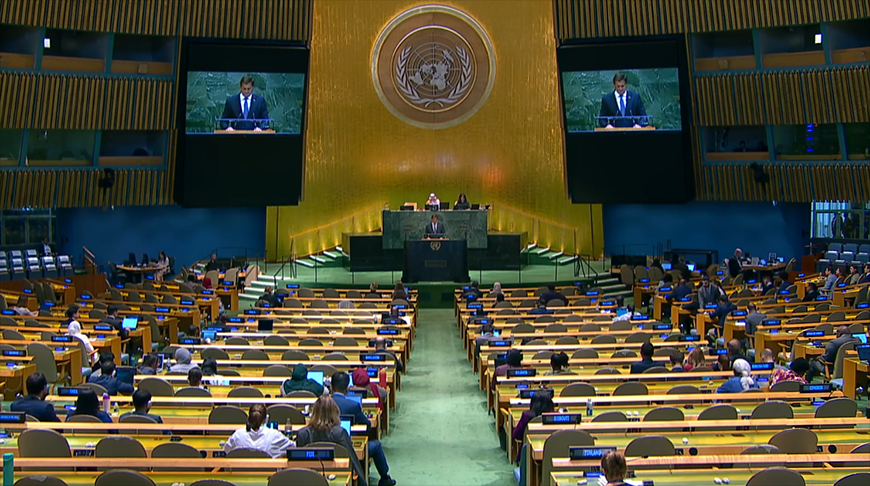
MINSK, 27 September (BelTA) – By rewriting history and its results, the West is challenging the legitimacy of the post-war world order, Belarusian Minister of Foreign Affairs Maxim Ryzhenkov said as he addressed the plenary meeting of the 80th session of the UN General Assembly in New York on 27 September, BelTA has learned.
The theme of this year’s general debate is dedicated to the organization’s anniversary: “Better together: 80 years and more for peace, development and human rights”. In this regard, the Belarusian foreign minister suggested recalling the events of 80 years ago and reflecting on them to find the true root causes of the challenges and threats the planet faces today.
“The bloody and merciless war that was a big tragedy for humankind ended 80 years ago. And only at the cost of millions of sacrifices and shattered lives did we overcome this challenge. The contribution of the United States and the UK to the Great Victory, as well as that of the Chinese people who threw off Japanese militarism, is evident,” Maxim Ryzhenkov stated. “However, the Soviet people’s heroism was decisive, a multinational people who fought for their freedom and the freedom of oppressed nations to the last drop of blood. Remember, they never surrendered their cities to the invaders, never sought refuge behind Nazi-collaborationist governments, never equipped or manned the Nazi war machine. Back then, 80 years ago, this was obvious.”

The minister noted that European capitals greeted liberators joyfully with flowers, erecting monuments and naming streets and cities after them.
“After just 80 years of peaceful prosperity in Europe, everything has changed. What do we see now? The West has created its own narrative about wartime events. It is erasing memory, tearing down monuments, rewriting history. Nazi slogans are again heard regularly in some European cities. Thus emerges a 21st-century generation unfamiliar with the war’s horrors, embracing the false heroism of their ancestors who joined Hitler’s coalition striving for global domination,” the Belarusian diplomat said.
Maxim Ryzhenkov argued that rewriting history means rewriting its results, thereby challenging the legitimacy of the post-war order, based on the principles of the UN.

“Seemingly, this world order was forced upon the West temporarily. The collective West had to share global responsibility with the so-called Soviet bloc, abandon its domination dreams temporarily, and wait. Wait for an opportunity to reverse the situation. As we have heard in this very hall recently, the Holocaust is called our collective shame. But why collective? History will judge each nation separately. Belarusians, for instance, fought Nazism to the death, sacrificing their lives to save thousands of Jews,” the Belarusian foreign minister emphasized.
“And we cannot remain silent about this today. We remember hundreds of villages burned by the Nazis along with their inhabitants. We remember millions of torn apart, mutilated Belarusians and hundreds of thousands of women and children taken into European slavery. Therefore, we understand that preserving memory is important so that history does not repeat itself. So that there are no more national ideologies of racial superiority where there is no place for entire peoples. So that there would be no concentration camps – this terrible invention of the West. And, of course, so that there would be no genocide against any of the peoples,” the minister added.
Screengrab/un.org













